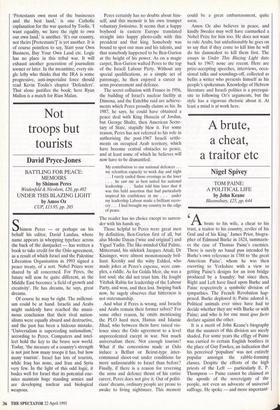Not troops but tourists
David Pryce-Jones
BATTLING FOR PEACE: MEMOIRS by Shimon Peres Weidenfeld & Nicolson, £20, pp.402 UNDER THIS BLAZING LIGHT by Amos Oz CUP, £13.95, pp. 205 Shimon Peres — or perhaps on his behalf his editor, David Landau, whose name appears in whopping typeface across the back of the dustjacket — has written a book to take credit for the Oslo agreement, as a result of which Israel and the Palestine Liberation Organisation in 1993 signed a peace treaty, of a sort. Nobel Prizes were shared by all concerned. For Peres, the future will now be quite different, as the Middle East becomes 'a field of growth and creativity'. He has dreams, he says, great dreams.
Of course he may be right. The millenni- um could be at hand. Israelis and Arabs might suddenly have reached the unani- mous conclusion that their rival nation- alisms were equally absurd and destructive, and the past has been a hideous mistake. `Universalism is superceding nationalism,' according to Peres. Computers and intel- lect hold the key to the brave new world. Today, 'the measure of a country's strength is not just how many troops it has, but how many tourists'. Israel has lots of tourists, while Iraq has none, and Iran and Syria very few. In the light of this odd logic, it bodes well for Israel that its potential ene- mies maintain huge standing armies and are developing nuclear and biological weapons. Peres certainly has no doubts about him- self, and this memoir is his own trumpet voluntary fortissimo. It seems that a happy boyhood in eastern Europe translated straight into happy photo-calls with this president and that king. Somebody was bound to spot our man and his talents, and that somebody happened to be Ben-Gurion at the height of his power. As on a magic carpet, Ben-Gurion wafted Peres to the top of the Israeli Labour Party. Without any special qualifications, as a simple act of patronage, he then enjoyed a career in arms procurement and defence.
The secret collusion with France in 1956, the building of Israel's nuclear facility at Dimona, and the Entebbe raid are achieve- ments which Peres proudly claims as his. In 1987, he says, he could have obtained a peace deal with King Hussein of Jordan, but George Shultz, then American Secre- tary of State, stupidly blew it. For some reason, Peres has not referred to his role in authorising the post-1967 Israeli settle- ments on occupied Arab territory, which have become central obstacles to peace, and at least some of which he believes will now have to be dismantled.
My contribution to our national defences . . . my relentless capacity to work day and night . . . I rarely ended those evenings as the loser . . . he saw me as best suited for national leadership . . . Sadat told him later that it was this bald assertion that had particularly inspired his confidence in me . . . under my leadership Labour made a brilliant recov- ery ... I had brought my country to the edge of peace.
The reader has no choice except to surren- der with his hands up.
Those helpful to Peres were great men by definition, Ben-Gurion first of all, but also Moshe Dayan (`wise and original') and Yigael Yadin. The like-minded Olaf Palme, Mitterrand, his sidekick Jacques Attali, Dr Kissinger, were almost monotonously bril- liant. Kreisky and the witty Eshkol, who made jokes at Peres's expense, were com- plex, a riddle. As for Golda Meir, she was a lost soul; she did not trust him. He fought Yitzhak Rabin for leadership of the Labour Party, and won, and then lost. Swiping back now, he sagely observes that bitterness is not statesmanship.
And what if Peres is wrong, and Israelis and Arabs remain their former selves? For some other reason, he omits mentioning the PLO hard men, Hamas and Islamic Jihad, who between them have raised vio- lence since the Oslo agreement to a level unprecedented except in war. Not much universalism there. Not enough tourists? What if the concessions made at Oslo induce a Belfast or Beirut-type inter- communal shoot-out under conditions far more unfavourable to Israel than before? Finally, if there is a reason for reversing the arms and defence thrust of his entire career, Peres does not give it. Out of politi- cians' dreams, ordinary people are prone to awake to living nightmare. This memoir could be a great embarrassment, quite soon.
Amos Oz also believes in peace, and kindly Swedes may well have earmarked a Nobel Prize for him too. He does not want to rule Arabs, but unfashionably he goes on to say that if they come to kill him he will do his damnedest to kill them first. The essays in Under This Blazing Light date back to 1967; none are recent. Here are prize-accepting speeches, interviews, occa- sional talks and soundings-off, collected as befits a writer who presents himself as his people's spokesman. Knowledge of Hebrew literature and Israeli politics is a prerequi- site to following Oz's arguments, but the style has a vigorous rhetoric about it. At least a mind is at work here.


























































 Previous page
Previous page